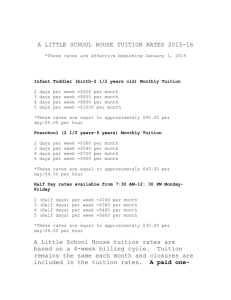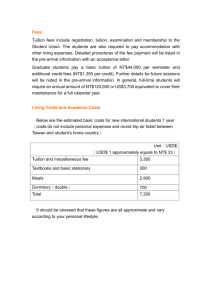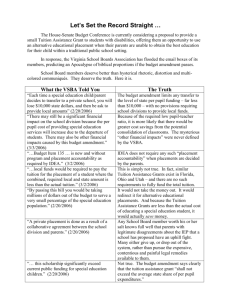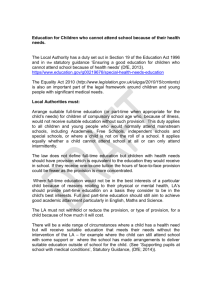home tuition service - Buckinghamshire County Council
advertisement
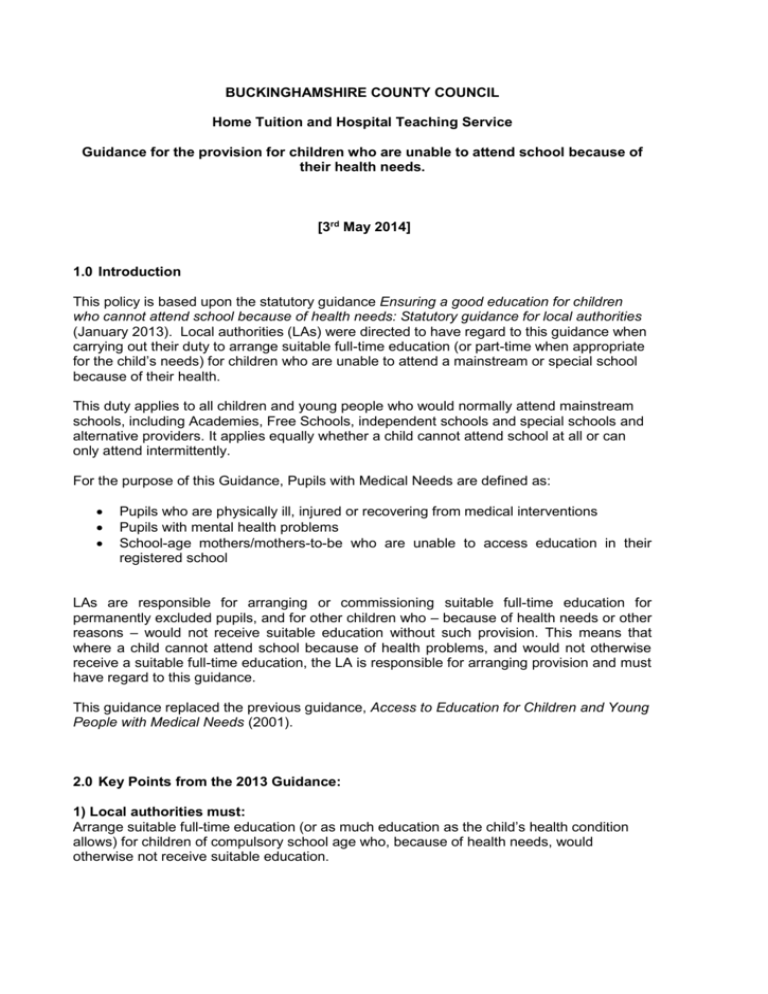
BUCKINGHAMSHIRE COUNTY COUNCIL Home Tuition and Hospital Teaching Service Guidance for the provision for children who are unable to attend school because of their health needs. [3rd May 2014] 1.0 Introduction This policy is based upon the statutory guidance Ensuring a good education for children who cannot attend school because of health needs: Statutory guidance for local authorities (January 2013). Local authorities (LAs) were directed to have regard to this guidance when carrying out their duty to arrange suitable full-time education (or part-time when appropriate for the child’s needs) for children who are unable to attend a mainstream or special school because of their health. This duty applies to all children and young people who would normally attend mainstream schools, including Academies, Free Schools, independent schools and special schools and alternative providers. It applies equally whether a child cannot attend school at all or can only attend intermittently. For the purpose of this Guidance, Pupils with Medical Needs are defined as: Pupils who are physically ill, injured or recovering from medical interventions Pupils with mental health problems School-age mothers/mothers-to-be who are unable to access education in their registered school LAs are responsible for arranging or commissioning suitable full-time education for permanently excluded pupils, and for other children who – because of health needs or other reasons – would not receive suitable education without such provision. This means that where a child cannot attend school because of health problems, and would not otherwise receive a suitable full-time education, the LA is responsible for arranging provision and must have regard to this guidance. This guidance replaced the previous guidance, Access to Education for Children and Young People with Medical Needs (2001). 2.0 Key Points from the 2013 Guidance: 1) Local authorities must: Arrange suitable full-time education (or as much education as the child’s health condition allows) for children of compulsory school age who, because of health needs, would otherwise not receive suitable education. Suitable provision means suitable to the child’s age, aptitude, ability and any special educational needs that he or she may have. Provision should be “full time” unless the pupil’s condition means that full-time provision would not be in his or her best interests. Although “Full-time education” is not defined in law but it should equate to what the pupil would normally have in school 1. 2) Local authorities should: i) Provide such education as soon as it is clear that the child will be away from school for 15 days or more, whether consecutive or cumulative. They should liaise with appropriate medical professionals to ensure minimal delay in arranging appropriate provision for the child. ii)_Ensure that the education children receive is of good quality (as defined in the Alternative Provision 2013 guidance), allows them to take appropriate qualifications, prevents them from slipping behind their peers in school and allows them to reintegrate successfully back into school as soon as possible. iii) Address the needs of individual children in arranging provision. ‘Hard and fast’ rules are inappropriate: they may limit the offer of education to children with a given condition and prevent their access to the right level of educational support which they are well enough to receive. Strict rules that limit the offer of education a child receives may also breach statutory requirements. iv) Where full-time education would not be in the best interests of a particular child because of reasons relating to their physical or mental health, LAs should provide part-time education on a basis they consider to be in the child's best interests. Full and part-time education should still aim to achieve good academic attainment particularly in English, Maths and Science. 3.0: Provision in Buckinghamshire 3.1: Provision for children who are unable to attend a mainstream or special school because of their health is delivered via the Blueprint and Wycombe Grange Pupil Referral Units. 3.2: The Buckinghamshire policy is premised on schools working collaboratively to support the education of children with health needs and an acknowledgement that the sharing of information between schools, health services and LAs is important. We will expect schools to work with the providers to ensure that the provision offered to the child is as effective as possible and that the child can be reintegrated back into school successfully. We recognise that parents also have a vital role to play, and will should encourage schools to have a publicly accessible policy that sets out how they will support children with health needs; 3.3: In order to better understand the needs of the child, and therefore choose the most appropriate provision, the LAs will work closely with medical professionals and the child’s family, and consider the medical evidence. We will make every effort to minimise the disruption to a child’s education. For example, where specific medical evidence, such as that provided by a medical consultant, is not quickly available, we will consider liaising with other medical professionals, such as the child’s GP, and consider looking at other evidence to ensure minimal delay in arranging appropriate provision for the child. 1 Buckinghamshire County Council define this as 25 hours per week over 5 days for secondary school age pupils 3.4: Once parents have provided evidence from a consultant, we will not request continuing evidence from the consultant without good reason, even where a child has long-term health problems. Evidence of the continuing additional health issues from the child’s GP will be seen as sufficient. In cases where it is felt that a consultant’s on-going opinion is absolutely necessary, we will give parents sufficient time to contact the consultant to obtain the evidence. 3.5: The law does not specify the point during a child’s health needs when it becomes the LA’s responsibility to secure suitable full-time education for a child. Schools would usually provide support to children who are absent from school because of health needs for a shorter period, for example when experiencing chicken pox or influenza. More generally, LAs should be ready to take responsibility for any child whose health needs will prevent them from attending school for 15 or more school days, either in one absence or over the course of a school year, and where suitable education is not otherwise being arranged. 3.6: Whenever pupils are referred to, the Blueprint and Wycombe Grange medical guidance will be sought to support the provision of education other than at school. In particular, the Service will wish to establish whether pupils are able to continue to receive some or all of their education at school. This may apply in particular to pupils with mental health needs, in whose case collaboration will be sought with colleagues in the Children and Adolescent Mental Health Service (CAMHS). 4.0: Hospital Tuition: 4.1 Buckinghamshire Health Trust provides hospital health care for children within the paediatric and National Spinal Injuries Centre at Stoke Mandeville Hospital. Therefore Bucks LA provides education for children admitted to the paediatric wards and National Spinal Injuries Centre at Stoke Mandeville hospital through the Hospital Teaching Service provided by Blueprint PRU 4.2 In some cases, where a child is hospitalised other than at Stoke Mandeville Hospital, the host hospital may provide education for the child within that hospital and the LA would not need to arrange any additional education, provided it is satisfied that the child is receiving suitable education. 4.3 With planned hospital admissions, LAs should give the teacher who will be teaching the child as much forewarning as possible, including the likely admission date and expected length of stay. This allows them to liaise with the child’s school and, where applicable, with the LA about the programme to be followed while the child is in hospital. LAs should set up a personal education plan, which should ensure that the child’s school, the LA and the hospital school or other provider can work together. 4.4 Pupils accessing CAMHS support at Orchard House in High Wycombe may also receive education. This will be delivered by the Wycombe Grange PRU at the Orchard House School Room. This provision will be delivered in line with the requirements set out in this guidance document. 5.0 Referrals 5.1 All referrals for tuition at home will be sent to the local Pupil Referral Unit Home Tuition Service Coordinator using the appropriate proforma [Appendix A]. Referral forms should be completed by the home school’s designated teacher or by the named LA officer with responsibility for this area. Each referral will, where this is available, include supporting medical evidence of the need for home tuition. 5.2 Unless the pupil has a long-term or recurring medical condition, a pupil out of school will not qualify for home tuition unless they are likely to be out of school for more than 15 working days, either as one absence or over the course of an academic year. 5.3 Following referral, medical evidence and advice from the school will be sought to establish the amount, pattern and location of tuition provided as well as to plan pupil reintegration at school. Home Tuition Service staff will initiate contact and liaise closely with the pupils, their families, their schools and other services as appropriate, including Social Services, Health, the Education Welfare Service, Connexions and with the Educational Psychologists providing a dedicated service to Pupils with Medical Needs. 5.4 In every case, contact will be made with the home school through the designated teacher. Information will be requested, in particular, the pupil’s level of attainment within the core subjects of the National Curriculum. Additionally, evidence of progress from standardised tests, or from Individual Education Plans in the case of pupils with Special Educational Needs, will contribute to the planning process. 5.5 School staff will work in partnership with the pupil, the Blueprint and Wycombe Grange staff and parents, and will make available to tutors information such as curriculum and lesson plans as well as materials to enable continuity in education provision. This will enable the providers to ensure that children unable to attend school because of health needs should be able to access suitable and flexible education appropriate to their needs. The nature of the provision will be responsive to the demands of what may be a changing health status. 5.6 As appropriate, arrangements will be made for pupils to undertake national tests and examinations. 6.0 School Responsibilities 6.1 At all times the pupil remains the responsibility of the school where they are on roll. 6.2 All schools must have a written policy and procedures for dealing with the education of children and young people with medical needs. This may stand alone, or be incorporated into the school policy on Special Educational Needs. 6.3 Each school must designate a named member of staff to be responsible for dealing with pupils who are unable to attend school because of medical needs. Where a pupil is known to have potentially long-term sickness or recurrent bouts of chronic sickness involving periods of absence, the designated teacher should contact the Community Paediatrician in order to discuss the management of continuing education, including referral to the Home Tuition Service. Through regular communication and forward planning, unnecessary gaps in education can be avoided. In every case, the designated teacher needs to inform parents and carers that other professionals are being consulted about their child’s absence from school. The designated teacher will take responsibility for supplying the Home Tuition Service with information about the pupil’s capabilities, progress and programme of work. The school will be active in the monitoring of progress during absence from school, in liaising with other agencies and in the pupil’s reintegration. 6.4 In cases of unpredictable, acute episodes of health needs resulting in absences from school of more than 15 days, the designated teacher should liaise appropriate medical professionals as soon as possible to establish whether referral to the Home Tuition Service is appropriate. 6.5 Schools will ensure that pupils, absent from school because of medical needs, are kept informed about school social events and that they are able to participate as fully as possible in the life of the school, for example in homework clubs, study support and liaising with peers through visits and videos. 6.6 Local authorities should be aware that under the Education (Pupil Registration) England Regulations 20068, a school can only remove a pupil who is unable to attend school because of additional health needs where: i) the pupil has been certified by the school medical officer as unlikely to be in a fit state of health to attend school, before ceasing to be of compulsory school age, and; ii) neither the pupil nor their parent has indicated to the school the intention to continue to attend the school, after ceasing to be of compulsory school age. 6.7 A child unable to attend school because of health needs must not, therefore, be removed from the school register without parental consent and certification from the school medical officer, even if the LA has become responsible for the child’s education. Continuity is important for children and knowing that they can return to their familiar surroundings and school friends can help their recovery and their educational progress. 6.8 In particular, it is expected that schools will: Liaise with the Home Tuition Service, in particular provide prompt up-to-date information about records of achievement and the curriculum. Consider the need for assessment under the SEN Code of Practice (Pupils with a Medical Need) and contact their link Educational Psychologist. Ensure that suitable programmes of work are available to pupils receiving home tuition/hospital teaching, that these are consistent with what the pupil would normally be studying whilst at school and that they take account of the pupil’s views. Where appropriate, provide resource material to support the programmes of work for the pupil where possible. Make appropriate contributions to the cost of providing home tuition as outlined in Section 8 of this document. Meet all examination fees on behalf of the pupil. Make arrangements for 11-plus, National Curriculum Assessments, GCSEs, A/AS levels and any other examinations/accreditations. Provide the funding for invigilators to ensure completion of any external examinations where it is not possible for the pupil to complete the assessment within the school or PRU. Invigilation of exams will be funded by the school where the pupil is on roll. Assess coursework. Maintain contact with the pupil and their family. Take part in planning and review meetings, especially those called to organise reintegration at school. 7.0 Local Authority Responsibilities 7.1 The Local Authority holds responsibility for ensuring that pupils with medical needs are able to access education by commissioning a high quality Home Tuition Service. This includes developing and implementing guidance which secures individual entitlement. The key to successful implementation is partnership between agencies and the Local Authority holding the central role in initiating, developing and sustaining these partnerships. The provision of education to pupils with medical needs through the Home Tuition Service aims to maintain pupil progress. This is essential to the timely reintegration into the school of each pupil in accordance with his/her medical needs. 7.2 Responsibility for the two Home Tuition Services Service rests with the Education Champion and the contact details for this officer are at the end of this document. 7.3 In particular, the Local Authority will ensure that: This guidance is readily available and widely publicised. Every pupil, who is unable to attend school because of a long-term or recurring medical condition, will have an Individual Learning Plan. Education should begin as soon as the medical condition allows. Education will be in place for Pupils with planned absences from school for medical reasons of 15 days or by the 6th day of any absence where that absence will be more than 15 days Pupils whose diagnosed medical condition indicates prolonged or recurring absence from school have access to education from day one of each absence where possible. Regular reports on pupil progress are provided in writing to the pupil, to parents and to the school. Multi-agency/multi-disciplinary working is promoted, with clear lines of communication, in particular ensuring appropriate liaison with medical professionals, including where appropriate CAMHS staff, relevant staff in the pupil’s school, education welfare officers, educational psychologists and any other involved professional parties. Continuity in education is supported, including promoting access to home school activities and events. An individually tailored reintegration plan which meets with multi-agency approval is in place before the pupil returns to school. Educational support continues to be provided by the Home Tuition and Hospital Teaching Service in those cases where reintegration is gradual and part-time. Home Tuition Service staffs receive appropriate professional support in order to sustain the quality of teaching and learning. The Home Tuition and Hospital Teaching Service is monitored and reviewed to ensure that the needs of pupils are met, that the service is cost-effective and that all relevant statutory requirements and guidance is adhered to. Appropriate information on the Home Tuition and Hospital Teaching Service is available. 8.0 Approaches and Strategies to be followed within the Buckinghamshire Home Tuition Service 8.1 Referral and Assessment: 8.1.1 On receipt of a referral letter the Home Tuition Service will make a home visit or seek a comparable visit by the Education Welfare Service in order to ensure that the tuition provided is appropriate to meet the needs of the pupil. 8.1.2 As an integral part of the assessment, the Home Tuition Service will decide whether it is in the best interest of the pupil to receive 1:1 tuition or whether the tuition can be delivered as part of small group. The needs of the pupil will also determine whether the tutor needs to deliver the tuition at the home of the pupil or whether the pupil can attend small group tuition at an appropriate centre. 8.2 Method of Delivery: 8.2.1 Provision is delivered by the Home Tuition and Hospital Teaching Service during term time only and any tuition carried out in the home will only take place if there is another adult present in the home at all times when tuition takes place 8.2.2 The Home Tuition Service will usually deploy staff registered within the Home Tuition Service but will also, where appropriate, seek to secure tuition that is delivered by a teacher or teaching assistant from the pupil’s normal school. In the latter case charging will be adjusted to acknowledge the teaching provided. 8.3 Level and Cost of Provision: 8.3.1The cost of running the Home Tuition Service is significant and income needs to be generated in order to offset some of these costs. The Home Tuition Service will seek a weekly charge equivalent to one-thirty-eighth of the appropriate AWPU for pupils of statutory age. 8.3.2Invoices will be raised on a termly basis at the end of each term. Schools will receive written advice of any charges at least 2 weeks prior to the charges being raised. 8.3.3In cases of post-16 education the Home Tuition Service will accept responsible for providing services where evidence is presented that the student is one or more academic years behind. In other cases involving post-16 students the Home Tuition Service is willing to cooperate with any school seeking to release the post 16 funding that has been assigned to that pupil and convert the funding into an equivalent allocation of home tuition. 8.4 Tutor Responsibilities: 8.4.1 Tutors employed by the Home Tuition Service will need to hold appropriate DBS clearance and to have undertaken child protection training. The Home Tuition Service will cover the cost of one DBS check per employee per annum. Any additional DBS checks necessitated by a break in service will need to be paid for by the employee. Staff will be required to attend basic safeguarding training as delivered by Buckinghamshire Local Authority and this will need to be updated every three years. 8.4.2 Tutors are expected to submit claim forms for hours worked, which may include tuition hours and meetings to support reviews and reintegration, and travel expenses on a regular basis to the appropriate place of tuition. These will be checked and approved by the local Home Tuition Service Coordinator and Bursar. 8.4.3 Tutors are also expected to maintain Individual Learning Plans and records of pupil progress regarding the tuition programme and progress of individual pupils. 9.0 Buckinghamshire Home Tuition Service Service Coordinator Aylesbury Vale: Home Tuition Service Coordinator Blueprint Blueprint Coventon Road Aylesbury Bucks HP 19 9JL Tel: 01296 387600 Fax: 01296 387600 E-mail:admin@blueprint.org.uk Service Coordinator Wycombe and Chiltern South Bucks: Service Coordinator The Wycombe Grange Pupil Referral Unit Amersham Hill High Wycombe HP13 6PQ Tel: 01494 445815 E-mail: office@wycombegrange.org.uk It is a requirement of the service that at least one other adult nominated by the parent/hospital staff is available on the premises during home/hospital tuition, ie the home tutor is not the only adult on the premises during tuition. Other premises may be used for home tuition, for example school or PRU premises, other County Council or Health Service premises. The additional available adult principle applies in each case. Locations within the hospital other than the designated schoolroom may be used for hospital tuition. All general enquiries regarding the Home Tuition and Hospital Teaching Service should be referred to the local Service Coordinator in the first place. Education Champion Issues concerning quality of service, including complaints, should be directed the Education Champion with responsibility for Children who are unable to attend a mainstream or special school because of their health. In absence of an officer in post the interim contact is: Adam Johnson, 14-19 Commissioner, Learning Skills and Prevention, Children & Young People's Services Buckinghamshire County Council 4th Floor, County Hall, Walton Street, Aylesbury, HP20 1UZ Tel: 01296 383201 E-mail: adjohnson@buckscc.gov.uk NB: this guidance will be reviewed against and updated in line with the SEND reforms when they come into place in the Autumn 2014 Appendix A BUCKINGHAMSHIRE COUNTY COUNCIL HOME TUITION SERVICE REFERRAL FORM A NAME OF PUPIL SCHOOL: SCHOOL CONTACT: SCHOOL ADDRESS: PHONE NUMBER: PUPIL ADDRESS: DoB: KEY STAGE: NAME OF PARENT/CARER: YEAR: TEL. NO: B SPECIAL EDUCATIONAL NEED (PLEASE SPECIFY): C REASON FOR REFERRAL: D Evidence attached in support of this referral (Please tick relevant boxes) Recommendation from Community Paediatrician / Hospital Consultant / CAMHS Consultant Reports from school Information from Education Welfare Service Name of Referrer: Date: Please return this form to the responsible Coordinator in your area. Aylesbury: High Wycombe Area/Chiltern South Bucks Home Tuition Service Coordinator Blueprint Coventon Road Aylesbury Bucks HP 19 9JL Home Tuition Service Coordinator The Wycombe Grange PRU 56 Amersham Hill High Wycombe, Bucks HP13 6PQ Tel: 01296 387600 Fax: 01296 387600 E-mail:admin@blueprint.org.uk Tel: 01494 445815 Fax: 01949 465860 E-mail: office@wycombegrange.org.uk



